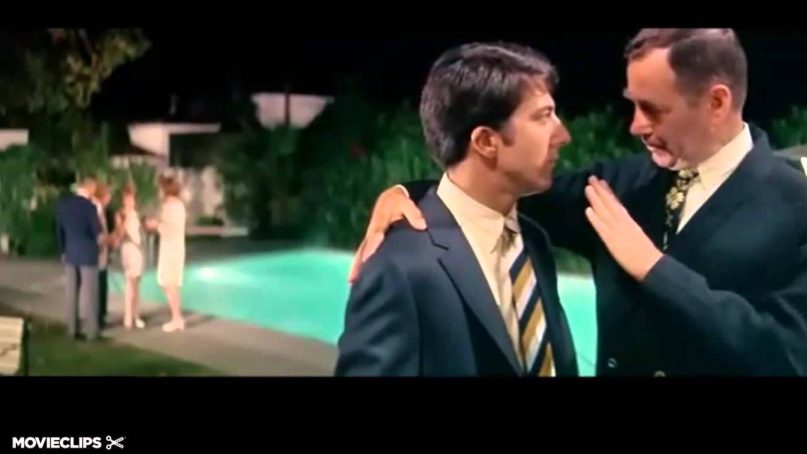This year, on Yom Kippur, we came up with a new tradition for the synagogue.
We played movie trivia.
Want to play?
OK.
What is the most important one-word quote in motion picture history?
The answer emerges from one of the great American movies of our time – The Graduate – which celebrates its fiftieth anniversary this year.
There was either nothing Jewish about this movie, or there was everything Jewish about this movie.
It is not only that it starred, in his first major role, Dustin Hoffman. Nor that Simon and Garfunkel provided the soundtrack. Totally Jewish.
Let’s face it: Ben Bradock could have been Ben Bronstein. Mrs. Robinson could have been Mrs. Rubenstein.
Ben Braddock is a product of southern California’s upper middle class. He has just graduated from college. He does not know what he wants out of life.
At his graduation party, he tells his father:
I’m just worried about my future…I want it to be different.
A few moments later, a family friend approaches Benjamin. He wants to tell him about where he will find his cutting edge opportunity in life.
I want to say one word to you. Just one word. Are you listening?
You all know the word that comes next.
There you have it. Perhaps the single most important one word line in all of motion picture history.
Ben Braddock’s older momentary mentor was telling him: jump on the newest opportunity.
But, back in the 1960s, “plastics” meant more than that. It meant people who were a. artificial, and/or b. people who could twist themselves into being whatever others thought they should be.
Therefore, I added a new sin to the liturgy’s list: the sin of being plastic.
To be plastic is to be artificial.
The Hasidic Rebbe, Mordechai of Lekhovitz, once attended the brit, the circumcision, of a friend’s son.
The friend asked him: “Rebbe, would you bless my son? Rebbe, would you impart some life wisdom to my son?”
The rebbe said these words to the infant, and to all those who were there: “May you not fool God, may you not fool yourself, and may you not fool people.”
To be plastic is to be malleable.
Don’t get me wrong. I believe in being flexible.
We are now into the festival of Sukkot. We shake the lulav.
What is the greatest quality of the lulav?
It is flexible.
But, you cannot be so flexible that you forget the core of who you are. When that happens, your soul breaks.
In the musical, Hamilton, we meet Alexander Hamilton as a young man. New York City. 1776. It is his first encounter with Aaron Burr, the man who would ultimately kill him in a duel.
Aaron Burr offers Hamilton some free advice:
Talk less
Smile more
Don’t let them know what you’re against or what you’re for.
To live in a way so that no one knows what you’re against or what you’re for – this is no way to live.
It is also no way for a Jew to live. Or, for Judaism to live.
How do we avoid the temptation of being plastic?
The answer is also in The Graduate.
What does Benjamin Braddock want to be?
He wants to be different.
Let’s talk about how Jews are different.
Jews have a different way of looking at time. There is a difference between Wednesday and Shabbat, and there is even a difference between Saturday and Shabbat. Think about it.
Jews have a different way of looking at places. There are places that are sacred.
There was a time when people would ask me: “Rabbi, could you ask someone from the audience to light candles?”
I would say to them: There is an audience in this sanctuary. But, the audience is not us.
The audience is God. We are the actors. The liturgy is our libretto.
But, ultimately, this is not for us. This is for God.
We Jews have a different way of eating. There is a difference between the slice of pizza and the piece of hallah. There is a time for pasta and a time for matzah. There is a time to eat and a time to refrain from eating. There are foods that Jews eat, and there are foods that we might consider not eating.
We Jews have a different way of learning. There are many places where Jewish kids can gain knowledge, and rack up stuff to put on their resumes.
But, the only place where Jewish children can gain wisdom is the synagogue.
Because Jews are different, and because Judaism is different, the former chief rabbi of Great Britain, Lord Jonathan Sacks, taught that Judaism demands the dignity of difference – that all people, and all peoples, are allowed – perhaps even commanded – to be different.
And finally: Judaism will teach you – not only to be different – but to make a difference. It is not enough to be different.
- You have to matter to your self.
- You have to matter to your family.
- You have to matter to your community.
- You have to matter to the world.
The more people you matter to, the better and deeper you will be.
Judaism will teach you how not to be plastic.
Judaism will teach you that it is just fine to be different.
Judaism will teach you how to matter.
(excerpted from my Yom Kippur morning sermon, Temple Solel, Hollywood, Florida)






